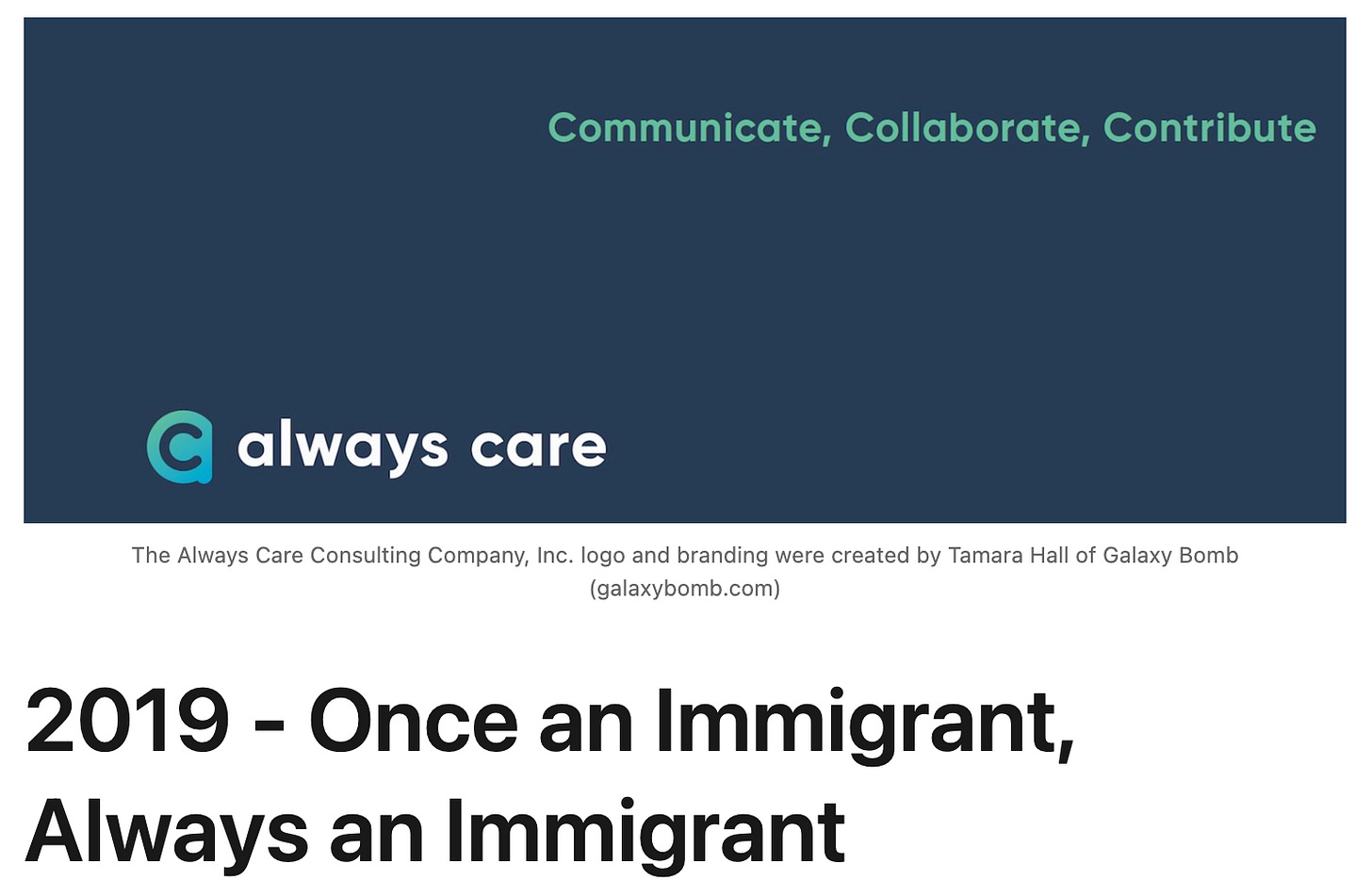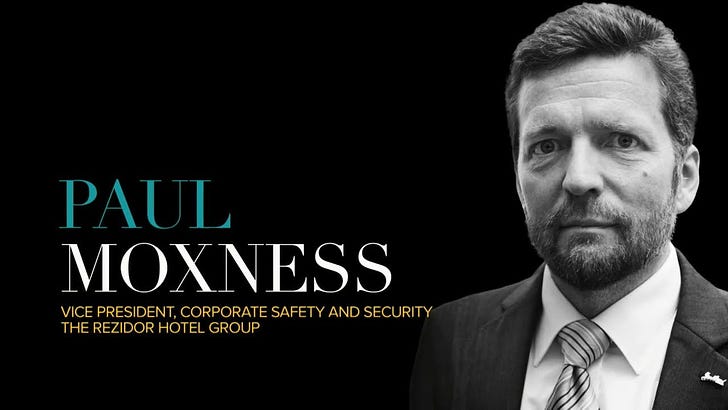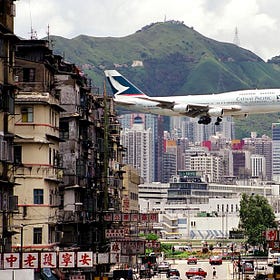Expats and Immigrants - What's the diff?
Hint: it has nothing and everything to do with where you're from


“Why aren’t you retired, yet?”, my old friend asked.
“Because I worked in the hotel industry.”, I offered.
“Yeah, but you were a high-flying expat VP!”, my friend countered in disbelief.
“Only for a brief time.”, I said. “For the first twenty years of my career, I was an immigrant, not an expat.”
“What’s the diff?”, my inquisitive amigo asked.
“Let me take you back to how I arrived in Europe”, I said. “I hope you have lots of time because it’s a long story.”
My pal poured himself another glass of wine and said, “I have all night.”
"Sink-or-Swim" or "Fake-It-Till-You-Make-It"?
I was eighteen when I graduated from high school. Between us, although I enjoyed my high school years immensely, they are still a bit of a blur. In any case, I’m not really sure I fully awoke from the hangover of my high school graduation party until I landed in Norway. My post-high school gap year began less than a week after I’d donned the KSS cape an…
After I learned to swim in my new surroundings, I spent six years as a perpetual student at University. I was still an immigrant. Every six months, I went to the police station and showed them a letter from the university that confirmed I had earned enough credits to renew my student visa which included a part-time work permit.
When the police discovered that I was working three jobs on my part-time permit, I learned the “one permit, one job” rule. A year later, following the rules earned me a trip to the taxman. Immigrant life isn’t always easy.
The taxman cometh
The letter from the taxman requiring me to attend a formal meeting was as unexpected as the letter I’d received from the police months earlier. What did they want with me? I wasn’t living the high life on an undeclared income. I was doing my best to comply with tax laws, other laws, and visa requirements.
My hotel career started about a year after I left university. I was working as a ticket taker in a movie theatre. It was fun. I had an awesome navy blue uniform with brass buttons and gold stripes on the cuffs of my jacket and down the seam of my trousers. I wore a hat that looked like a prop from “An Officer and a Gentleman”.
The job was relatively well-paid compared to most of the student jobs I’d had but watching Ferris Bueller’s Day Off 400 times does get a little boring after a while.
My big break came when, thanks to a housing crisis in the Norwegian capital, I was able to take a 40% pay cut to quit my theatre gig and become a hotel security guard. The housing crisis forced the only other person who applied for the job to turn it down.
And so, my career in hotels began.
How I Thrived at a Company That Didn't Want to Hire me
How it started Having left university with an unfinished Master’s Degree in Psychology, I was working as a ticket taker in a movie theatre in Norway when an ad in a newspaper caught my eye in 1987: "Security Guard - Five Star Hotel". I knew nothing about hotels or security, but the hotel was owned by an airline and I wanted to work in travel.
Our hotel had several foreigners but apart from the Executive Chef, we were all immigrants and not expats. At one point, we had an expat GM for a short while. Despite his Scandinavian ancestry, he left after less than a year and went back to Asia where expat life was more rewarding. I’m not sure what he meant by that, but it could be that he didn’t have to pay his wife’s traffic violation tickets there. I only say this because he looked at me weirdly when he asked me what to do with her tickets and I responded, “Pay them.”
When our company’s headquarters relocated from Oslo to Brussels in 1989, several colleagues moved with the HQ and became expats. Security “wasn’t important enough” to be a full-time job, so the security manager in our flagship Oslo hotel oversaw corporate security too.
At the time, I was happy to stay in Oslo. I thought I was living in a perfect marriage but, more importantly, I knew it wasn’t possible to move because I was part of the most secretive planning operation in Norway since WWII - we were planning the funeral for a King who wasn’t ill.
My then-wife’s first words to me when I returned home ten days after the King died in 1991 were, “I don’t want to be married to you anymore.” I had kept one too many secrets from her. We divorced amicably and I spent my thirties paying off my share of a mortgage on a home I no longer lived in.
The best thing to come out of my first marriage was that I was free to marry the love of my life when I finally met her. The second best thing was that I could use my freedom to travel. Yes, I was paying a mortgage on a home I didn’t live in, but fortunately, I had learned how I could travel business class for free, so I travelled. A lot.
How to Travel Business Class for Free
In early March 1990, a tragic fire at the Sheraton Hotel in Cairo, Egypt claimed the lives of 17 people. The crew of a Scandinavian Airlines flight to Copenhagen were staying at the hotel and evacuated during the disaster. They all survived, but all were shaken and traumatized. They couldn’t work the flight to Copenhagen and it had to be cancelled.
At the end of 1997, I was offered a job in Copenhagen. The company wanted me to head up security at our three hotels there and oversee corporate security too. It was an exciting opportunity. I tried to do my due diligence and when discussing terms with my boss-to-be, the topic of taxes came up. I had heard that Denmark was even more harshly taxed than Norway.
“Us expats only pay a limited amount of tax and the company takes care of that.”, he said.
I didn’t realize he was talking about “us” as in him and the other expat executives rather than “us” as in him and me.
I was also too naïve to realize it was a ploy to get me to accept a lowball offer and prove to his bosses in Brussels that he could keep personnel costs down. (I’ve always had a bit of an issue with bonuses that are paid to people if they’re good at paying other people lower wages than they deserve.)
It took some time before I realized how naive I’d been. A couple of months passed before I was paid any salary at all because I was stuck in a financial Catch-22. I couldn’t get a bank account in Denmark because I couldn’t show them any payslips from the company and my salary couldn’t be paid because the company only direct deposited into Danish accounts for immigrants. Paying into a foreign account wasn’t an issue for expats like my boss.
When I finally was paid and realized I’d taken another pay cut for the opportunity to be “promoted” and work in Denmark, I confronted my boss.
“Sometimes you have to learn the hard way”, my Norwegian superior said. Then he told me that to qualify as an expat, my salary would have had to be three times what it was…
In Denmark, the executive from the neighbouring country was an expat, while I, a security manager from a country halfway around the world, was an immigrant.
In 2007, after passing on a couple of should we or shouldn’t we opportunities, I finally became an expat.
I moved to Brussels...
This post is the final of four in a series inspired by Nolan Yuma’s: “A support group for people who have to deal with bureaucrats.” My first contribution a few weeks ago was “The Lensmann from Orkdal”. Two weeks ago, to celebrate my wife’s first Canada Day, I told you about “
Our decade in Brussels was wonderful, but we were conscious of the fact that we were living in a bubble that wasn’t offered to others. The company paid for our housing, our car, our internet and our telecommunication. They paid our taxes, too. We lived a nice life with no bills and a nice wad of pocket money each month.
Many of my colleagues in Brussels were expats. Even some who lived in neighbouring countries a short drive away. One complained that the company wouldn’t pay mileage for them to take their children to see the family doctor in their home country 90 minutes away.
Life was good, but I could never shake the feeling of unfairness. People who worked as hard as I did but were local accountants did not have the same benefits we expats did. One year, when the business climate was tough due to an economic downturn, expats were offered a new bonus system because it was clear that no one would qualify under the system we all signed up for. When I told my boss, I would decline unless it was offered to local staff, he said, “As expats we deserve the benefit of extra compensation as an incentive.” As if having the company pay all our bills and taxes wasn’t a benefit.
He seemed to forget that it was the local staff who weren’t paid bonuses who ended up doing the work to deposit the bonuses into the expat bank accounts.

The company I worked for didn’t celebrate when I decided to leave after more than thirty years nor did they send a memo or inform people around the company that I had left. The rumour mill said I’d been fired. The truth was that I showed them that there was more money to save if I left than if they fired all three of my direct reports.
I didn’t want to fire my deputy who had been by my side for thirty years and who only had 14 months left until he reached full retirement age. Nor did I want to fire my Belgian colleague. Most of his costs were recovered because Belgium paid our company for the fact we hired a person who was physically challenged after being partially paralyzed in an accident in the 90s. The person who told me to fire my team was unaware of his handicap.
Instead of using a moral argument, I chose the money argument. When money talks, the C-suite listens.
My buddy had emptied another glass of wine. Mine was also empty. He refilled them both.
“What a bummer. You must be frustrated.”
"Not as frustrated as I would have been if I hadn’t stayed true to my ethics and values.”, I replied. “Besides, I don’t golf and my brain is always going a mile a minute, so I might as well put it to positive use!”
I’ve often said you meet far more interesting people when you travel in economy class than in business class.
To me, that’s one of the differences between immigrants and expats too.
Stay safe, Always Care
Thanks for reading our newsletter! It means a lot to me. I’m grateful and hope you’ll consider hitting the “like” and “share” buttons or adding a comment if you enjoyed this article.
If you’re in hospitality, read our book, Spin the Bottle Service. A local server told us it should be required reading for everyone who works in a restaurant or hotel.
If you’re an owner or manager of a business that takes pride in quality and customer service, let’s chat about how Ditch the Script workshops can make jobs more meaningful and guest experiences more memorable by unleashing the power of the biggest business differentiator you have available - your people!
In addition to writing stories, I love to tell them.
As a multi-award-winning corporate leader in the fields of hospitality and global security, captivating keynotes, compelling coaching sessions, and edutaining, motivational workshops are all part of my repertoire.
Email me at paul@alwayscare.ca.
For more articles like this, click the 87 Stories tab, where we share lessons learned at the University of Life.
Thanks for being part of the Always Care Community!









I know many of these struggles! I too have never had the much longed-for expat package…I still say that as though I’m waving jazz hands around: **expat packagggge**. That’s the dream for many of us abroad and only a privileged few can secure it!
I appreciate how you manage to keep a calm and collected attitude about the mistreatment you suffered along your career. I guess the years that passed help on that, they give you perspective. When money talks, the c-suite listens -- never truer words!
The way you portray the difference between expats and immigrants through your experience makes one never want to become an expat. The extra expats get is money and privilege, but I wouldn't want that if it comes at the expense of my humanity.